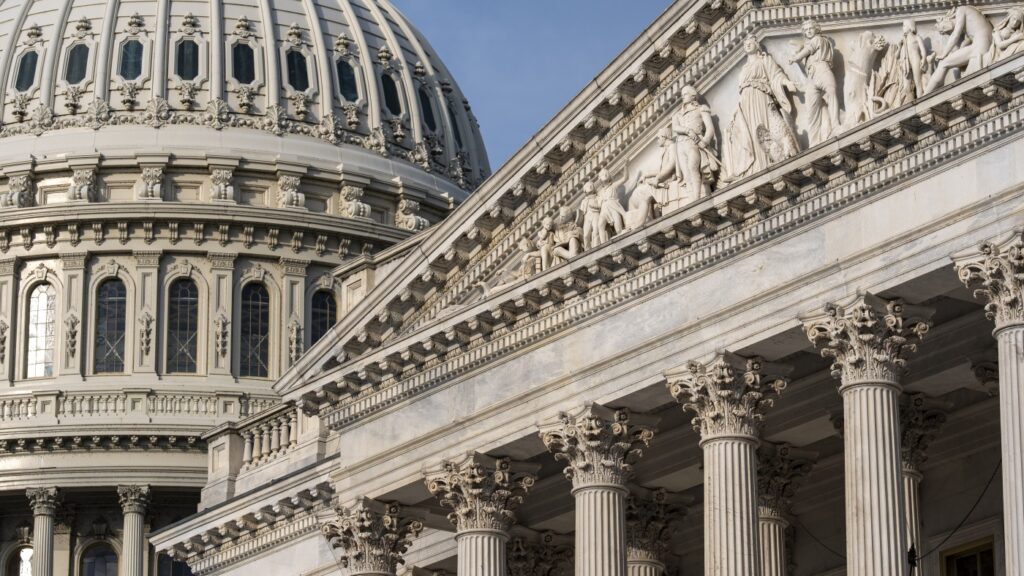
The Senate side of the Capitol is seen in Washington, early Monday, June 30, 2025, as Republicans plan to begin a final push to advance President Donald Trump's big tax breaks and spending cuts package. (AP Photo/J. Scott Applewhite)
Senate Republicans have successfully passed President Trump’s sweeping domestic policy bill, setting the stage for a decisive vote in the House. The legislation, which aims to cut trillions in taxes while reducing spending on Medicaid, food assistance, and clean energy programs, passed with a narrow 51-50 vote. Vice President JD Vance broke the tie. Notably, three Republican senators—Susan Collins of Maine, Thom Tillis of North Carolina, and Rand Paul of Kentucky—voted against the bill. The bill now heads to the House, where it faces significant opposition from some GOP lawmakers.
This development follows weeks of intense negotiations among Senate Republicans. Fiscal conservatives pushed for deeper spending cuts, while others raised concerns about the potential nationwide impact of these reductions. The bill aims to extend the tax cuts enacted in 2017, preventing a hike in rates set to occur at the end of this year. However, this extension comes at a cost, with significant reductions to the Supplemental Nutrition Assistance Program (SNAP) and major changes to Medicaid, affecting millions of Americans.
Contentious Negotiations and Political Maneuvering
The vote highlights President Trump’s influence in uniting the Republican Party’s various factions. “With this legislation, we’re fulfilling the mandate we were entrusted with last November and setting our country and the American people up to be safer, stronger, and more prosperous,” said Senate Majority Leader John Thune, R-S.D., following the vote.
To pass the bill, Republicans utilized a special budget tool known as reconciliation, allowing them to bypass a Democratic filibuster and approve the bill with a simple majority. This maneuver required the legislation to adhere to strict Senate rules, focusing primarily on budget and spending-related elements. Consequently, several GOP priorities were stripped from the final version.
However, the bill’s passage in the Senate is just the beginning. Republicans in both chambers must agree on identical versions before it can be sent to President Trump for his signature. The Senate version may not satisfy the narrow GOP majority in the House, posing a challenge for House Speaker Mike Johnson, R-La.
Implications for Medicaid and SNAP
The Senate bill’s broad outlines largely mirror the version passed by House Republicans in May. Both versions propose extending the 2017 tax cuts, increasing military and immigration enforcement spending, and fulfilling several of Trump’s campaign promises, such as eliminating taxes on overtime and tips, albeit temporarily.
One of the most contentious aspects of the bill is its approach to Medicaid. House Republicans proposed trimming costs by introducing new work requirements for childless adults without disabilities. The Senate expanded these requirements to include parents of older children, sparking further debate. Additionally, the Senate sought to limit provider taxes, a mechanism states use to secure more federal matching dollars for Medicaid. To address concerns about the potential collapse of rural hospitals, the Senate included a $50 billion fund to support them starting in 2026.
“I strongly support extending the tax relief for families and small businesses,” said Senator Susan Collins. “My vote against this bill stems primarily from the harmful impact it will have on Medicaid, affecting low-income families and rural health care providers like our hospitals and nursing homes.”
Fiscal Concerns and the Debt Ceiling
Another point of contention is the proposed increase in the debt ceiling. The House approved a $4 trillion hike, while the Senate opted for $5 trillion. Treasury Secretary Scott Bessent has warned that without action, the U.S. risks a potentially catastrophic default as early as August. The nonpartisan Congressional Budget Office estimates that the Senate bill would add over $3 trillion to the deficit over the next decade.
The bill also modifies the deduction for state and local taxes (SALT), a key issue for GOP lawmakers from high-tax blue states. The House set the SALT cap at $40,000 for married couples with incomes up to $500,000, while the Senate plan retains this threshold but allows it to expire after 2028.
Additionally, the bill targets clean energy credits from the Inflation Reduction Act, proposing to roll back these credits aggressively. This move aims to appease fiscal hawks from the ultra-conservative House Freedom Caucus, but it could halt significant investments, particularly in red states.
Looking Ahead: Challenges and Consequences
The passage of this bill represents a significant political victory for President Trump and Senate Republicans, but it also sets up a challenging battle in the House. Speaker Mike Johnson faces the daunting task of uniting his party’s divided factions to pass the bill without further amendments. With a razor-thin majority, the margin for error is minimal.
The outcome of this legislative effort will have far-reaching implications for millions of Americans, particularly those reliant on Medicaid and SNAP. As the bill moves to the House, its potential impact on the nation’s fiscal health and social safety net programs will be closely scrutinized.
As the Fourth of July deadline approaches, the nation watches closely to see if Republicans can deliver on their promises and navigate the complex political landscape to pass this landmark legislation.





